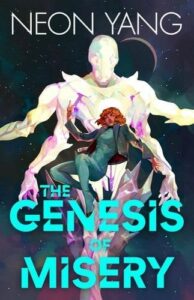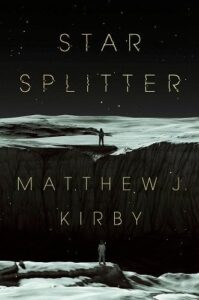Buy this from Bookshop.org to support local bookstores and the Lesbrary!
Misery Nomaki (she/they) wields the power to manipulate holystone, an ability only saints or those void-touched have. She believes she is void mad, while the angel that guides her, Ruin, tells her she is the next Messiah. But regardless of what is the truth, Misery only knows they want to get out of their small town and search for freedom. The powers that be have other plans for them though. As she continues to use her wits to find a way out of her predicament, Misery is led down a path that may reveal the truth about her true identity as Messiah.
Yang’s world-building is overwhelming for the first few chapters. The story drops you right in the middle of the action with jargon that, while it stems from English, makes zero sense if you don’t already know this world. And presumably, you don’t know this world, because it’s the first in what may be meant to be a series. Once you pick up the lingo, though, things start to roll.
A theocratic government rules Misery’s world, but it is at war with the Heretics, those who believe in science over religion. Misery couldn’t care less about either school of thought. Having grown up poor in the forgotten outskirts of the empire trapped by the Faith, no matter what, she wants a place in the world for herself. But every move they make brings them closer to their destiny.
Part of Yang’s world-building includes the normalization of sharing one’s pronouns. It’s part of everyone’s profile when a character downloads the information constantly coming in through a chip in their brains. If someone’s pronouns are not known, it simply states unknown. None of this is made a big deal and neopronouns are quite common. This gender fluidity leads to a standard of queer relationships.
When the throne wants to come after Misery, Lady Lee Alodia Lightning, the empire’s princess, takes it upon herself to capture them. Their relationship starts with contention, to say the least, as Lady Lee wants to kill Misery. But as the story unfolds, their paths come closer together, leading to a romantic relationship. However, there isn’t enough time spent on the page showing just how this comes to happen. Their dynamic never breaches the surface, so it’s hard to believe them coming together.
The story takes an interesting trajectory, as Misery’s character arc doesn’t follow a typical hero’s journey. At least, not the one readers may expect. As she dives further into her lie of being a Messiah, events and signs point to it being true. They become a zealot, making it hard as a reader to continue having compassion for them. I didn’t come to hate Misery, but she started to make me uncomfortable.
The end leaves readers with more questions than answers. It certainly made me intrigued and wanting another book to continue the story.


